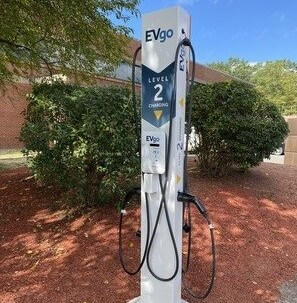EVgo Inc., a fleet electrification owner and operator, and OSC~WEBco, a global provider of comprehensive, fully integrated solutions to the federal government, have been awarded participation in a new five-year blanket purchase agreement (BPA) with the United States General Services Administration (GSA) to furnish electric vehicle supply equipment (EVSE) and ancillary services.
This BPA is the next step in a process for EVgo to offer a variety of fast-charging and level 2 charging solutions for federal fleet vehicles across government agencies, the military and more.
OSC~WEBco, with EVgo as a subcontractor, is one of only 16 awardees, and one of two awarded veteran-owned small businesses for this BPA round. The combined OSC~WEBco EVgo team’s products and services include charging solutions to fit a wide range of fleet charging needs, including Level 2 and DC fast-charging stations, as well as network and operations/maintenance plans, site planning and preparation, power management, metering, and basic install assistance.
The team’s EVSE products, as well as ordering resources will be published on the GSA Multiple Award Schedule (MAS) and GSA EVSE webpages in the coming weeks.
With the BPA, federal agencies and approved government buyers will be able to work with EVgo and OSC~WEBco to plan, build and install charging stations for their fleets without lengthy procurement processes.
“EVgo knows that partnership is critical to getting fleets electrified and teaming up with OSC~WEBco to offer charging solutions to the federal fleet is a winning proposition,” says Cathy Zoi, CEO of EVgo. “From rideshare and autonomous vehicles to delivery and soon federal fleets, EVgo is positioned to help everyone take advantage of the benefits of driving electric.”
According to the GSA FY20 Federal Fleet Report, U.S. federal fleet includes over 650,000 vehicles and consumed 372 million gallons of gasoline in 2020. Less than 3% of the fleet is currently electric. While the U.S. government currently owns about 1,100 charging stations, supporting an electric federal fleet could require more than 100,000 additional stations over the next decade, per testimony from the Government Accountability Office.





